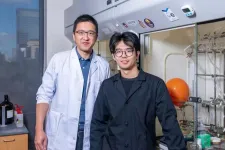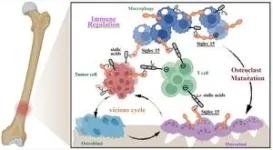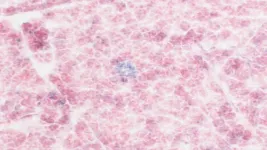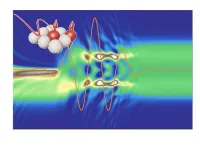(Press-News.org) HOUSTON – (Jan. 24, 2023) – Rice University researchers in the lab of chemist Han Xiao have identified a promising new immunological pathway to treat stubborn bone tumors, one of most prevalent forms of metastases in breast cancer patients.
“More than 70% of people with metastatic breast cancer will see the cancer cells move to bone, which can lead to skeletal-related events like bone pain, fractures, and hypercalcemia,” said Yixian Wang, a Rice graduate student in the Han lab who is a lead author on a study published in Proceedings of the National Academy of Sciences. “There are now several immunotherapies that can potentially benefit breast cancer patients with metastases, but they aren’t effective in patients with bone tumors.”
Each year, more than 240,000 new cases of breast cancer are diagnosed in the United States, according to the Centers for Disease Control and Prevention. Approximately one-quarter of those patients will experience metastasis, where cancer cells spread from the breast to other parts of the body. New immunotherapies called checkpoint inhibitors can uncloak stubborn tumors, allowing the immune system to send in powerful immune cells to deal with the abnormal cells. But while checkpoint inhibitors are effective for many patients, they do not work for everyone ⎯ and clinical trials have shown little to no response when used to treat bone metastases.
Xiao, associate professor of chemistry, biosciences, and bioengineering at Rice, said he and his team wanted to find another pathway that might be more effective in obliterating these stubborn bone metastases.
“We thought there must be another novel checkpoint axis we could target for the breast cancer cells in bone,” Xiao said. “And we discovered a unique glyco-immune checkpoint axis in bone metastases that involves a protein called sialic acid-binding Ig-like lectin (Siglec)-15. We learned that it suppresses immune cells in the bone.”
After noting that there was a significant upregulation of Siglec-15 in the tumor microenvironment in bone tumor samples from breast cancer patients, Xiao and colleagues demonstrated that this receptor plays an important role in hiding bone tumors from the immune surveillance.
“Current FDA-approved checkpoint inhibitors are mediated by protein-protein interactions that suppress immune cells,” Xiao explained. “Siglec-15, however, is a glyco-immune checkpoint inhibitor. Instead of binding to a protein, Siglec-15 binds to the sugars you find on the cell surfaces ⎯ and that’s how it can suppress the immune system. This is an entirely new type of immune checkpoint that offers great promise for future treatment for bone cancers.”
Xiao’s team conducted several cell culture experiments to study Siglec-15 interactions in the bone tumor microenvironment. They learned it is involved in crosstalk between tumor cells and important immune cells like T-cells and macrophages, as well as bone-specific cells, osteoclasts.
“You can find these glycolipids and glycoproteins on all cells ⎯ and we know they play an important role in immune modulation,” added Xiao. “These findings offer us an opportunity to study these glyco-immune checkpoint inhibitors more in depth and identify those that can help bone tumors stop evading immune recognition.”
But simply modulating the behavior of Siglec-15 may be enough to treat bone metastases. When the team injected a monoclonal antibody that targets Siglec-15 into an animal model of metastatic breast cancer with bone tumors, they were able to trigger a powerful immune response. In fact, the researchers saw the tumors diminish after only one or two doses of the antibody therapy.
“It was really a striking finding,” said Wang. “I’m very excited about the potential therapeutic outcome for a therapy like this. This could be a very helpful treatment for breast cancer patients in the future.”
Xiao said he and his team plan to continue studying the new and unique biology of glyco-immune checkpoint pathways in the tumor microenvironment. He added there is still much to learn about these pathways and future studies should provide new biological insights with the power to improve both current and future immunotherapies. In addition, Xiao said he would like to see if targeting Siglec-15 might be helpful in treating other kinds of cancers that affect bone.
The research was supported by the Cancer Prevention Research Institute of Texas (RR170014), the National Institutes of Health (R01-CA277838, R35-GM133706, R21-CA255894, R01-AI165079) the U.S. Department of Defense (HT9425-23-1-0494, W81XWH-21-1-0789), the John S. Dunn Foundation and Rice University.
-30-
This release was authored by Kayt Sukel and can be found online at news.rice.edu.
Follow Rice News and Media Relations via Twitter @RiceUNews.
Peer-reviewed paper:
Siglec-15/Sialic Acid Axis as a Central Glyco-Immune Checkpoint in Breast Cancer Bone Metastasis | Proceedings of the National Academy of Sciences | DOI: 10.1073/pnas.2312929121
Authors: Yixian Wang, Zhan Xu, Kuan-Lin Wu, Liqun Yu, Chenhang Wang, Haoxue Ding, Yang Gao, Han Sun, Yi-Hsuan Wu, Meng Xia, Yuda Chen and Han Xiao
https://doi.org/10.1073/pnas.2312929121
Image downloads:
https://news-network.rice.edu/news/files/2024/01/240103_Han-Xiao-with-Yixian-Wang_Gustavo--af8f3518d906de73.jpg
CAPTION: Han Xiao (left) and Yixian Wang (Photo by Gustavo Raskosky/Rice University)
https://news-network.rice.edu/news/files/2024/01/240103_Han-Xiao-with-Yixian-Wang_Gustavo-102207-4a7364784651b99c.jpg
CAPTION: Yixian Wang (left) and Han Xiao (Photo by Gustavo Raskosky/Rice University)
https://news-network.rice.edu/news/files/2024/01/research-schematic-f7a95407b821945f.jpg
CAPTION: Siglec-15 is involved in the crosstalk between metastatic bone tumors and immune cells, establishing a vicious cycle that allows immune cell suppression. (Image courtesy of the Xiao lab/Rice University)
Related stories:
Rice U. chemist wins $3.2 million National Cancer Institute grant:
https://news.rice.edu/news/2023/rice-chemist-wins-32m-national-cancer-institute-grant
Rice, Baylor developing ‘glyco-immune’ checkpoint inhibitor:
https://news.rice.edu/news/2023/rice-baylor-developing-glyco-immune-checkpoint-inhibitor
Antibody with engineered peptide targets bone metastasis:
https://news.rice.edu/news/2022/antibody-engineered-peptide-targets-bone-metastasis
Links:
The Xiao lab: https://xiao.rice.edu/People/hanxiao/hanxiao.html
Rice Department of Chemical and Biomolecular Engineering: https://chbe.rice.edu/
Rice Department of Chemistry: https://chemistry.rice.edu/
Wiess School of Natural Sciences: https://naturalsciences.rice.edu/
George R. Brown School of Engineering: https://engineering.rice.edu
Bioscience Research Collaborative: https://brc.rice.edu/
About Rice:
Located on a 300-acre forested campus in Houston, Rice University is consistently ranked among the nation’s top 20 universities by U.S. News & World Report. Rice has highly respected schools of architecture, business, continuing studies, engineering, humanities, music, natural sciences and social sciences and is home to the Baker Institute for Public Policy. With 4,574 undergraduates and 3,982 graduate students, Rice’s undergraduate student-to-faculty ratio is just under 6-to-1. Its residential college system builds close-knit communities and lifelong friendships, just one reason why Rice is ranked No. 1 for lots of race/class interaction, No. 2 for best-run colleges and No. 12 for quality of life by the Princeton Review. Rice is also rated as a best value among private universities by Kiplinger’s Personal Finance.
END
Rice study unlocks breakthrough for breast cancer bone metastases
Immunological pathway promises to treat stubborn bone tumors
2024-01-24
ELSE PRESS RELEASES FROM THIS DATE:
The fountain of youth is … a T cell?
2024-01-24
The fountain of youth has eluded explorers for ages. It turns out the magic anti-aging elixir might have been inside us all along.
Cold Spring Harbor Laboratory (CSHL) Assistant Professor Corina Amor Vegas and colleagues have discovered that T cells can be reprogrammed to fight aging, so to speak. Given the right set of genetic modifications, these white blood cells can attack another group of cells known as senescent cells. These cells are thought to be responsible for many of the diseases we grapple with later in life.
Senescent cells are those that stop replicating. As we age, they build up in our bodies, ...
Infants born to COVID-infected mothers have triple the risk of developing respiratory distress
2024-01-24
New UCLA-led research finds that infants born full term to mothers who were infected with COVID-19 during pregnancy had three times the risk of having respiratory distress compared with unexposed infants, even though they themselves were not infected with the virus. The risk was significantly lower when the mothers infected during pregnancy were previously vaccinated.
The researchers found that in-utero exposure to SARS-CoV-2 sparked an “inflammatory cascade” in the infants, increasing the risk of a breathing disorder that most often ...
More than half of US adults don’t know heart disease is leading cause of death, despite 100-year reign
2024-01-24
Highlights:
More than half (51%) of respondents in a 2023 Harris Poll survey conducted on behalf of the American Heart Association did not identify heart disease as the leading cause of death in the U.S.
According to the 2024 Heart Disease and Stroke Statistics: A Report of U.S. and Global Data From the American Heart Association, heart disease has been the leading cause of death in the U.S. for 100 years.
Heart disease along with stroke, which is the fifth leading cause of death, claimed more lives ...
Ultrafast excitations in correlated systems
2024-01-24
An international team of researchers from the European XFEL together with colleagues from the Max Born Institute in Berlin, Universities of Berlin and Hamburg, The University of Tokyo, the Japanese National Institute of Advanced Industrial Science and Technology (AIST), the Dutch Radboud University, Imperial College London, and Hamburg Center for Ultrafast Imaging, have presented new ideas for ultrafast multi-dimensional spectroscopy of strongly correlated solids. This work has now been published in Nature Photonics.
"Strongly correlated solids are complex and fascinating quantum systems in which new electronic states often ...
Chemotherapy becomes more efficient when senescent cells are eliminated by immunotherapy
2024-01-24
Barcelona, 24 January 2024 – Cancer treatments, including chemotherapy, in addition to killing a large number of tumour cells, also result in the generation of senescent tumour cells (also called “zombi cells”). While senescent cells do not reproduce, they do, unfortunately, generate a favourable environment for the expansion of tumour cells that may have escaped the effects of the chemotherapy and eventually result in tumour regrowth.
An international team of researchers led by Dr. Manuel Serrano at IRB Barcelona have described how cancer cells that have become senescent after ...
TRAILS AI Institute announces first round of Seed Funding
2024-01-24
The Institute for Trustworthy AI in Law & Society (TRAILS) has unveiled an inaugural round of seed grants designed to integrate a greater diversity of stakeholders into the artificial intelligence (AI) development and governance lifecycle, ultimately creating positive feedback loops to improve trustworthiness, accessibility and efficacy in AI-infused systems.
The eight grants announced on January 24, 2024—ranging from $100K to $150K apiece and totaling just over $1.5 million—were awarded to interdisciplinary ...
Cognitive behavioral therapy alters brain activity in children with anxiety
2024-01-24
Researchers at the National Institutes of Health have found overactivation in many brain regions, including the frontal and parietal lobes and the amygdala, in unmedicated children with anxiety disorders. They also showed that treatment with cognitive behavioral therapy (CBT) led to improvements in clinical symptoms and brain functioning. The findings illuminate the brain mechanisms underlying the acute effects of CBT to treat one of the most common mental disorders. The study, published in the American Journal of Psychiatry, was led by researchers at NIH’s ...
Do different plant-based diets affect pregnancy and birth outcomes?
2024-01-24
Women who follow vegan diets during pregnancy may face higher risks of developing preeclampsia and of giving birth to newborns with lower birth weight, suggests a recent study published in Acta Obstetricia et Gynecologica Scandinavica.
For the study, 65,872 women identified themselves as omnivorous, 666 as fish/poultry vegetarians, 183 as lacto/ovo vegetarians, and 18 as vegans. Based on a questionnaire completed mid-pregnancy, investigators found that protein intake was lower among lacto/ovo vegetarians (13.3%) and vegans (10.4%) compared with omnivorous participants (15.4%). Micronutrient intake was also ...
Do couples’ wages differ based on interracial versus intraracial marriage?
2024-01-24
In a study published in Economic Inquiry, investigators compared wages of Black and white interracially married individuals with those of intraracially married individuals in the United States.
After controlling for other factors that influence wages, the researchers found a wage penalty for white males in interracial marriages and a wage premium for Black males in interracial marriages, compared with their same sex and race counterparts in intraracial marriages. There were no wage penalties or premiums for white or Black females in interracial marriages.
The study also ...
How does climate change affect eczema?
2024-01-24
In an analysis of all relevant published studies that assessed atopic dermatitis (also known as eczema) associated with trends in climate-related hazards due to greenhouse gas emissions, investigators found that impacts include direct effects on eczema, like particulate matter-induced inflammation from wildfires, and indirect effects, such as stress resulting from drought-induced food insecurity.
In their research published in Allergy, the scientists created maps showing the past, ...
LAST 30 PRESS RELEASES:
New NYUAD study reveals hidden stress facing coral reef fish in the Arabian Gulf
36 months later: Distance learning in the wake of COVID-19
Blaming beavers for flood damage is bad policy and bad science, Concordia research shows
The new ‘forever’ contaminant? SFU study raises alarm on marine fiberglass pollution
Shorter early-life telomere length as a predictor of survival
Why do female caribou have antlers?
How studying yeast in the gut could lead to new, better drugs
Chemists thought phosphorus had shown all its cards. It surprised them with a new move
A feedback loop of rising submissions and overburdened peer reviewers threatens the peer review system of the scientific literature
Rediscovered music may never sound the same twice, according to new Surrey study
Ochsner Baton Rouge expands specialty physicians and providers at area clinics and O’Neal hospital
New strategies aim at HIV’s last strongholds
Ambitious climate policy ensures reduction of CO2 emissions
Frontiers in Science Deep Dive webinar series: How bacteria can reclaim lost energy, nutrients, and clean water from wastewater
UMaine researcher develops model to protect freshwater fish worldwide from extinction
Illinois and UChicago physicists develop a new method to measure the expansion rate of the universe
Pathway to residency program helps kids and the pediatrician shortage
How the color of a theater affects sound perception
Ensuring smartphones have not been tampered with
Overdiagnosis of papillary thyroid cancer
Association of dual eligibility and medicare type with quality of postacute care after stroke
Shine a light, build a crystal
AI-powered platform accelerates discovery of new mRNA delivery materials
Quantum effect could power the next generation of battery-free devices
New research finds heart health benefits in combining mango and avocado daily
New research finds peanut butter consumption builds muscle power in older adults
Study identifies aging-associated mitochondrial circular RNAs
The brain’s primitive ‘fear center’ is actually a sophisticated mediator
Brain Healthy Campus Collaborative announces winner of first-ever Brain Health Prize
Tokyo Bay’s night lights reveal hidden boundaries between species
[Press-News.org] Rice study unlocks breakthrough for breast cancer bone metastasesImmunological pathway promises to treat stubborn bone tumors






